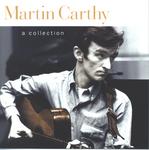> Martin Carthy > Records > A Collection
Martin Carthy: A Collection
 |
A Collection Topic Records TSCD750 (CD, UK, 1999) |
This is a collection of two song each from the first six LPs by Martin Carthy and Dave Swarbrick, recorded between 1965 and 1971.
Compilation and production for CD by Tony Engle.
Notes by David Suff. Song notes by Martin Carthy.
Original photographs by Brian Shuel / Collections.
Digital sleeve design / tinting by
John Haxby,
Edinburgh
Note that there is a different CD from 1993 called The Collection.
Musicians
Martin Carthy: vocals, guitar;
Dave Swarbrick: guitar [3, 4, 10]
Tracks
- The Trees They Do Grow High (Roud 31; Laws O35; G/D 6:1222) (3.31)
- Lord Franklin (Roud 487; Laws K9; G/D 1:16; Henry H815) (3.35)
- The Bloody Gardener (Roud 1700) (3.58)
- Poor Murdered Woman (Roud 1064) (2.48)
- Seven Yellow Gypsies (Roud 1; Child 200; G/D 2:278; Henry H124) (5.10)
- The Bold Poachers (Roud 1686) (4.52)
- Scarborough Fair (Roud 12; Child 2; G/D 2:329) (3.25)
- Lowlands of Holland (Roud 484; G/D 6:1116; Henry H180) (2.53)
- Davy Lowston (3.09)
- Streets of Forbes (Roud 20764) (3.20)
- Polly on the Shore (Roud 811) (3.50)
- Cold Haily Windy Night (Roud 135; G/D 4:778) (4.24)
Tracks 1 and 7 are from
Martin Carthy (1965)
Tracks 2 and 8 are from
Second Album (1966)
Tracks 3 and 9 are from
Byker Hill (1967)
Tracks 4 and 10 are from
But Two Came By (1968)
Tracks 5 and 11 are from
Prince Heathen (1969)
Tracks 6 and 12 are from
Landfall (1971)
Sleeve Notes
To write about the career of Martin Carthy is to write about the rich and diverse history of the English folk song revival since the early 1960s. He has long been regarded as one of its pivotal figures - both his vocal and guitar styles being two of the most consistent, distinctive and influential sounds on the scene. Over the past four decades, Martin’s influence has extended far beyond the British Isles. It is well documented elsewhere that his early work was an inspiration to Bob Dylan and Paul Simon. Martin’s reading of Lord Franklin became the template for Bob Dylan’s Dream, whilst his version of Scarborough Fair was the basis for the popular Simon & Garfunkel hit. More recently his influence has been detected in the work of artists as diverse as Paul Weller, Richard Thompson and Ultramarine.
In early 1966 Martin began an association with Dave Swarbrick—the finest fiddler on the folk scene and a remarkably sympathetic accompanist. At a time when the very notion of accompanied folk song was hotly debated, they defined the dynamic potential of the interplay between fiddle and guitar. This collection draws upon the half-dozen seminal albums that Martin and Dave recorded between 1965 and 1970—the period when Martin’s immediately identifiable vocal and spare guitar styles were being forged.
Over the next three decades Martin recorded two of the earliest and finest albums by Steeleye Span; the Albion Country Band’s classic Battle of the Field; three remarkable records with the Watersons, and three with the genre-defining Brass Monkey. Recently he has recorded two splendid albums with Waterson:Carthy - the critically acclaimed family partnership. At the time of writing, he has just released Signs of Life - one of his very finest recordings yet. Martin’s extraordinarily rich career has seen him performing in clubs and at festivals around the world, on radio and television, and in theatrical productions at the Royal National Theatre and with the Royal Shakespeare Company. In 1998 Martin was awarded an MBE for his services to English folk music.
(David Suff)

